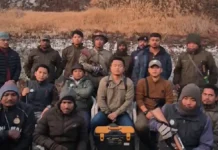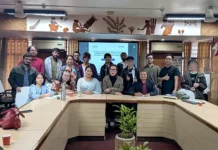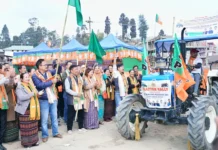[Nyatum Doke]
This story is not a story of grand victory or of grand success. It is the story of a beginning, of an initiation of hope, and of zeal and determination to make a difference, however small it may be.
Remote Ozakhoa village, in Chubam circle, 25 kms away from Longding HQ, is not some usual village. As one enters the village, in addition to the lush green valleys, one can see a series of locally-made bamboo dustbins throughout the village. The village is one of the cleanest and has received certificates of appreciation from the district administration for its various efforts and initiatives. What differentiates this village from any other village is the young and visionary leadership of Gram Panchayat Chairman (GPC) Wangjem Wangsu, who is passionate about bringing positive changes in the village.
Wangsu is not a highly educated person; he has studied till Class 10. “Due to family responsibilities after the demise of my mother, I could not continue studies, which I sometimes regret,” he said.
However, education never came in the way of his determination to do something for the society. On being asked why he joined politics, he said, “I never intended to join politics, but I always wanted to do something for the society, especially my village. It makes me feel good and gives me inner peace.”
His efforts can be gauged from the fact that Ozakho is the first village to get 100 percent Covid vaccination coverage in the district. It also achieved the feat of being the first village with 100 percent tap water coverage under the Jal Jeevan Mission. To add, the village is also covered 100 percent under the CMAAY. He said that the government comes up with so many schemes for the benefit of the people, and, as a leader, it is his duty to ensure that his people get the most out of these schemes. Apart from this, the village has been taking up some initiatives which are worth emulating by other villages and panchayats.
The village has formed a 50-member ‘cleanliness committee’ which ensures that social service and cleanliness activities are carried out every weekend. Also, plastic is banned within the premises of the village, and resolutions have been passed to not use plastic disposables. Instead, bamboo glass and traditional wild leaves are to be used. Also, he said that the villagers have conceptualised a concept of yearly ‘Dustbin Day’, during which “each family will make two bamboo dustbins; one will be donated to the committee and other will be installed in their household,” Wangsu said.
Furthermore, the panchayat, in order to maintain the ecological balance, has taken several measures towards sustainable livelihood, including banning hunting and poaching of wild animals.
Wangsu said that the paddy fields of the village were destroyed on several occasions by insects, and that later they learnt from experts that these insects were supposed to be eaten by birds. “But sadly, the birds no longer exist,” he lamented.
In addition, unsustainable fishing through bombing and generator has also been prohibited in Ozakho village. Felling of trees for commercial purpose is also banned by the villagers. If at all they have to cut a tree for some personal use, the resolution says: “In place of one tree, you have to plant two,”
Further, drug/opium addicts are not allowed to take leadership positions in any social, political, or religious bodies in the village. The villagers are strictly against any form of addiction. Even commercial sale of local wine is prohibited.
One will wonder where the village is getting funds from for such efforts. The answer is that the villagers, under the leadership of the GPC, have started a poultry farm, which at present has more than 300 chickens and has already started to generate money. Also, the village water and sanitation committee has fixed water tariff at Rs 50 per month. “Already Rs 63,500 fund has been generated,” Wangjem said. The money collected is kept in the panchayat account and is used for various developmental activities in the villages, whenever the need arises.
On being asked about the fund, Wangsu said that, “for now, the fund that the panchayat is receiving is less, as it is based on the old population census of 2011, according to which the population is about 500. But now the panchayat has a population of more than 1,000. Hopefully, with the new census, the issues will be resolved.”
He further said: “With the love and blessing of the people of the village and the support of the government, I hope to fulfil dream of making the village a model village one day.”
“More enriching training and awareness programmes for the PRI leaders under the SIRD&PR should be conducted. The training in Sikkim, provided by the SIRD&PR, was an eye-opener for me and many others,” he added.
I hope the story of the initiatives taken up by Wangsu and the villagers will continue and inspire others to take small steps and make a difference. (The writer is DIPRO Longding.)




